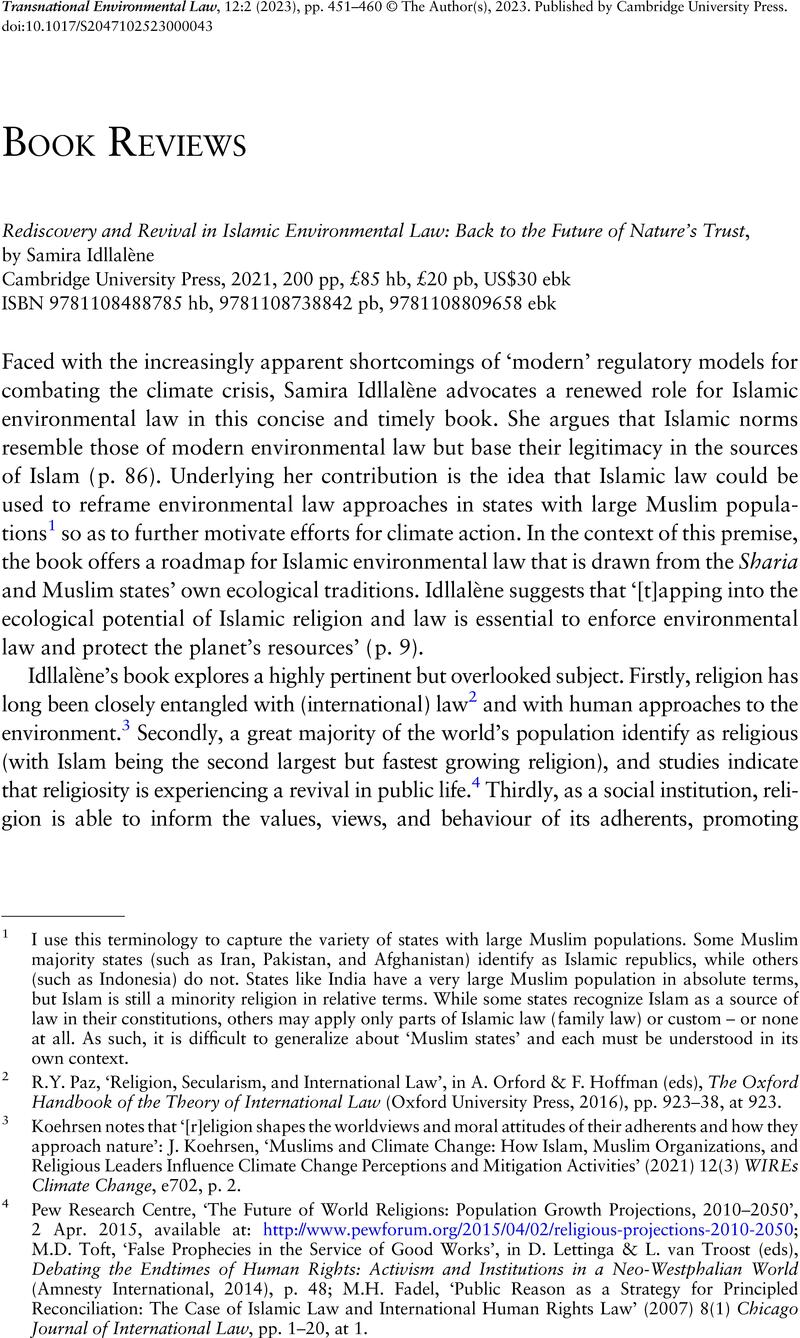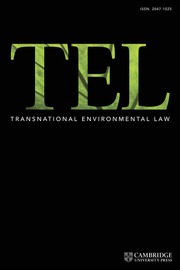No CrossRef data available.
Article contents
Rediscovery and Revival in Islamic Environmental Law: Back to the Future of Nature's Trust, by Samira Idllalène Cambridge University Press, 2021, 200 pp, £85 hb, £20 pb, US$30 ebk ISBN 9781108488785 hb, 9781108738842 pb, 9781108809658 ebk
Review products
Published online by Cambridge University Press: 11 May 2023
Abstract

- Type
- Book Reviews
- Information
- Copyright
- Copyright © The Author(s), 2023. Published by Cambridge University Press
References
1 I use this terminology to capture the variety of states with large Muslim populations. Some Muslim majority states (such as Iran, Pakistan, and Afghanistan) identify as Islamic republics, while others (such as Indonesia) do not. States like India have a very large Muslim population in absolute terms, but Islam is still a minority religion in relative terms. While some states recognize Islam as a source of law in their constitutions, others may apply only parts of Islamic law (family law) or custom – or none at all. As such, it is difficult to generalize about ‘Muslim states’ and each must be understood in its own context.
2 Paz, R.Y., ‘Religion, Secularism, and International Law’, in Orford, A. & Hoffman, F. (eds), The Oxford Handbook of the Theory of International Law (Oxford University Press, 2016), pp. 923–38CrossRefGoogle Scholar, at 923.
3 Koehrsen notes that ‘[r]eligion shapes the worldviews and moral attitudes of their adherents and how they approach nature’: Koehrsen, J., ‘Muslims and Climate Change: How Islam, Muslim Organizations, and Religious Leaders Influence Climate Change Perceptions and Mitigation Activities’ (2021) 12(3) WIREs Climate Change, e702, p. 2CrossRefGoogle Scholar.
4 Pew Research Centre, ‘The Future of World Religions: Population Growth Projections, 2010–2050’, 2 Apr. 2015, available at: http://www.pewforum.org/2015/04/02/religious-projections-2010-2050; Toft, M.D., ‘False Prophecies in the Service of Good Works’, in Lettinga, D. & van Troost, L. (eds), Debating the Endtimes of Human Rights: Activism and Institutions in a Neo-Westphalian World (Amnesty International, 2014), p. 48Google Scholar; Fadel, M.H., ‘Public Reason as a Strategy for Principled Reconciliation: The Case of Islamic Law and International Human Rights Law’ (2007) 8(1) Chicago Journal of International Law, pp. 1–20, at 1Google Scholar.
5 Fraser, J., Social Institutions and International Human Rights Law Implementation: ‘Every Organ of Society’ (Cambridge University Press, 2020), p. 15CrossRefGoogle Scholar.
6 While there is a growing range of scholarly interest in the nexus between religion (mainly Christianity) and climate change, most of it is in the field of religious studies and not the legal discipline.
7 UN Special Rapporteur in the Field of Cultural Rights, ‘Report on Climate Change, Culture and Cultural Rights’, 10 Aug. 2020, UN Doc. A/75/298, available at: https://www.ohchr.org/en/documents/thematic-reports/a75298-report-climate-change-culture-and-cultural-rights.
8 See Kaminski, J.J., ‘The OIC and the Paris 2015 Climate Change Agreement: Islam and the Environment’, in Pal, L.A. & Tok, M.E. (eds), Global Governance and Muslim Organisations (Palgrave Macmillan, 2019), pp. 171–95CrossRefGoogle Scholar, at 174.
9 Ibid., p. 190 (noting that ‘7 of the top 15 oil-producing states in the world are OIC [Organisation of Islamic Cooperation] member states: Saudi Arabia, Iraq, the UAE, Iran, Kuwait, Nigeria, and Qatar’).
10 For a study of the Hadith regarding nature and its protection, see S. Noorhidayat, A.Z. Abidin & I. Ahmadi, ‘Understanding Hadith on Nature Conservation: An Effort to Reinforce Ecological Piety’ (2022) 7(10) KnE Social Sciences, pp. 24–35.
11 Hallaq, W., An Introduction to Islamic Law (Cambridge University Press, 2019), p. 27Google Scholar.
12 Ramlan, S., ‘Implementing Islamic law to Protect the Environment: Insights from Singapore, Malaysia, and Indonesia’ (2020) 23(2) Asia Pacific Journal of Environmental LawCrossRefGoogle Scholar; Gade, A.M., ‘Islamic Law and the Environment in Indonesia: Fatwa and Da'wa’ (2015) 19(2) World Views Environment Culture Religion, pp. 161–83CrossRefGoogle Scholar; Koehrsen, n. 3 above, pp. 9–11; F.M. Mangunjaya & G. Praharawati, ‘Fatwas on Boosting Environmental Conservation in Indonesia’ (2019) 10(10) Religions, pp. 1–14.
13 See MUI Fatwa No. 128/MUI-KS/XII/2006 on forest fires and smog; Fatwa No. 22 of 2011 on Environmentally Friendly Mining Practices; Fatwa No. 4 of 2014 on the Protection of Endangered Species to Maintain the Balanced Ecosystem; Fatwa No. 127/MUI-KS/XII/2006 on Illegal Logging and Illegal Mining by a Kalimantan Branch of MUI; Fatwa on Burning Forest, 14 Nov. 2006; Fatwa No. 1/MUNAS-IX/MUI/2015 on the Utilization of Zakat Infaq Shadaqah and Waqf (ZISWAF) for the Construction of Clean Water & Sanitation for Communities.
14 See, e.g., J. Peel & J. Lin, ‘Transnational Climate Litigation: The Contribution of the Global South’ (2019) 113(4) American Journal of International Law, pp. 679–726.
15 A. Omar Nasseef, Secretary General, Muslim World League, The Muslim Declaration on Nature (Assisi, 1986).
16 International Islamic Climate Change Symposium, Islamic Declaration on Global Climate Change, 17–18 Aug. 2015, available at: http://islamicclimatedeclaration.org/islamic-declaration-on-global-climate-change.
17 Kaminski, n. 8 above, p. 180.
18 Menchik has argued that secular and sacred forms of knowledge ‘are mutually constitutive and co-evolve over time’: Menchik, J., ‘The Co-evolution of the Sacred and Secular: Islamic Law and Family Planning in Indonesia’ (2014) 22(3) South East Asia Research, pp. 359–78, at 362CrossRefGoogle Scholar.
19 Grotius, who is lauded as the ‘father of international law’, wrote more prolifically on Christian theology than he did on international law: Bigge, D.M., ‘Justifications for the Promotion of Religious Diversity on the International Bench’, in F. Baetens (ed.), Identity and Diversity on the International Bench (Oxford University Press, 2020), pp. 62–78CrossRefGoogle Scholar, at 70, n. 32; C.A. Stumpf, ‘Christian and Islamic Traditions of Public International Law’ (2005) 7 Journal of the History of International Law, pp. 69–80, at 74.
20 Fraser, n. 5 above, p. 290.
21 See, e.g., Merry, S.E., ‘Transnational Human Rights and Local Activism: Mapping the Middle’ (2006) 108(1) American Anthropologist, pp. 38–51CrossRefGoogle Scholar; An-Na'im, A.A., ‘Conclusion’, in A.A. An-Na'im (ed.), Human Rights in Cross-Cultural Perspectives: A Quest for Consensus (University of Pennsylvania Press, 1992), pp. 427–37CrossRefGoogle Scholar.
22 Fraser, n. 5 above, p. 212.
23 A.U. Alkali & K.A. Daud, ‘An Expository Study of Islamic Environmental Law’ (2014) 28 Journal of Law, Policy and Globalization, pp. 87–96, at 94.
24 Koehrsen, n. 3 above, p. 2.
25 Veldman, R.G., Haluza-DeLay, A. Szasz & R., ‘Climate Change and Religion as Global Phenomena: Summing Up and Directions for Further Research’, in R.G. Veldman, A. Szasz & R. Haluza-DeLay (eds), How the World's Religions are Responding to Climate Change: Social Scientific Investigations (Routledge, 2014), pp. 297–326Google Scholar, at 310.
26 Koehrsen, n. 3 above, p. 10.
27 Ibid., p. 6.
28 Hallaq, n. 11 above, p. 27.
29 Veldman, Szasz & Haluza-DeLay, n. 25 above, p. 302; J. Copeland Nagle, ‘The Evangelical Debate over Climate Change’ (2008) 5(1) University of St Thomas Law Journal, pp. 53–86, at 69–70. This view is not endorsed by the Pope in his 2015 ‘Encyclical Letter Laudato Si’ of the Holy Father Francis on Care for Our Common Home’, available at: http://www.vatican.va/content/dam/francesco/pdf/encyclicals/documents/papa-francesco_20150524_enciclica-laudato-si_en.pdf.
30 R.G. Veldman, A. Szasz & R. Haluza-DeLay, ‘Social Science, Religions and Climate Change’, in Veldman, Szasz & Haluza-DeLay, n. 25 above, pp. 5–22, at 7.




